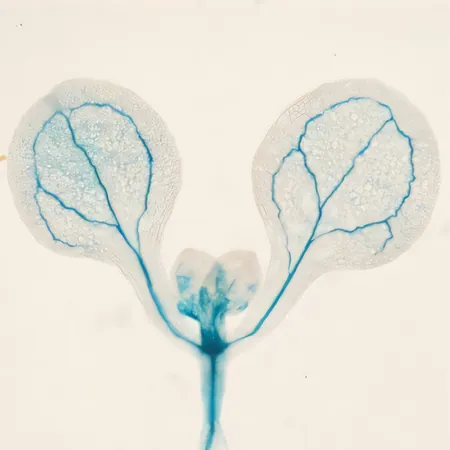
Groundbreaking Discovery: Compounds That Delay Flowering Could Revolutionize Crop Yields!
2025-03-28
Author: Rajesh
As climate change continues to challenge global food security, scientists around the world are racing against time to uncover innovative solutions to enhance agricultural productivity. Unpredictable weather patterns and extreme climatic conditions are disrupting the established rhythms of farming, fueling the urgent need for advanced technologies that can manage plant growth timing more effectively.
A crucial phase in a plant’s life cycle is flowering, which is influenced by various factors, including environmental conditions, genetic makeup, and photoperiod. In many plant species, a cold exposure phase known as vernalization is vital before they can bloom in the spring. However, once flowering commences, plants shift their resources from leaf growth to seed production, resulting in decreased nutritional value for leafy crops.
Surprisingly, scientists have made lesser progress in understanding the mechanisms that can naturally halt or even reverse this flowering preparation phase—referred to as devernalization—until now.
Recently, a breakthrough research team headed by Assistant Professor Makoto Shirakawa at the Nara Institute of Science and Technology (NAIST) in Japan has embarked on an exploration of the molecular foundations of devernalization. Their dedication led to the identification of a new class of small molecules dubbed devernalizers (DVRs) that can trigger this reversal process without the need for heat treatment in the model plant Arabidopsis thaliana.
Published in the reputable journal Communications Biology, the findings revealed that after meticulously screening over 16,000 chemical compounds, the researchers pinpointed five effective DVRs capable of reactivating the FLOWERING LOCUS C gene—a key player that inhibits flowering. This innovative approach holds the promise of delaying flowering even following initial vernalization, potentially transforming farming practices.
Remarkably, three of these DVRs contained two specific structural features—a hydantoin-like segment and a spiro-like carbon—which proved critical for their devernalization effect. Among these, a standout compound named DVR06 was identified, noted for its simpler structure yet remarkable effectiveness in delaying flowering without any negative effects on plant health. Genome-wide analysis pointed out that DVR06's impact was more targeted compared to the traditionally cumbersome heat-induced devernalization methods.
Assistant Professor Shirakawa expressed enthusiasm over this discovery, stating, "We realized that using heat treatment in the field is both labor-intensive and costly. Learning that DVR06 could achieve a more selective effect was exhilarating. This was a significant validation of our extensive screening efforts."
This groundbreaking discovery of DVR06 has the potential to usher in a new generation of agricultural technologies that empower farmers to manipulate flowering times effectively. By postponing flowering, farmers can ensure that leafy crops retain their valuable nutrients for extended periods, leading to enhanced yields and minimized food waste.
Looking forward, the research team aims to optimize the effectiveness of DVRs further. Co-researcher Toshiro Ito emphasized, "We are committed to exploring ways to modify the structures of DVRs to develop even more powerful and specific compounds. Our goal is to translate these research insights into practical technologies that support stable food production in an ever-changing global climate."
The implications of this research could be monumental, potentially revolutionizing how crops are cultivated and ensuring food security amidst the uncertainties posed by climate change. Stay tuned for more updates as this exciting field of study progresses!

 Brasil (PT)
Brasil (PT)
 Canada (EN)
Canada (EN)
 Chile (ES)
Chile (ES)
 Česko (CS)
Česko (CS)
 대한민국 (KO)
대한민국 (KO)
 España (ES)
España (ES)
 France (FR)
France (FR)
 Hong Kong (EN)
Hong Kong (EN)
 Italia (IT)
Italia (IT)
 日本 (JA)
日本 (JA)
 Magyarország (HU)
Magyarország (HU)
 Norge (NO)
Norge (NO)
 Polska (PL)
Polska (PL)
 Schweiz (DE)
Schweiz (DE)
 Singapore (EN)
Singapore (EN)
 Sverige (SV)
Sverige (SV)
 Suomi (FI)
Suomi (FI)
 Türkiye (TR)
Türkiye (TR)
 الإمارات العربية المتحدة (AR)
الإمارات العربية المتحدة (AR)